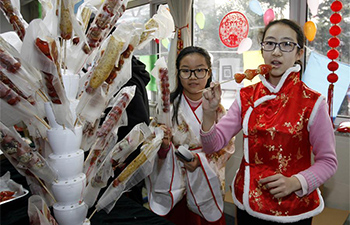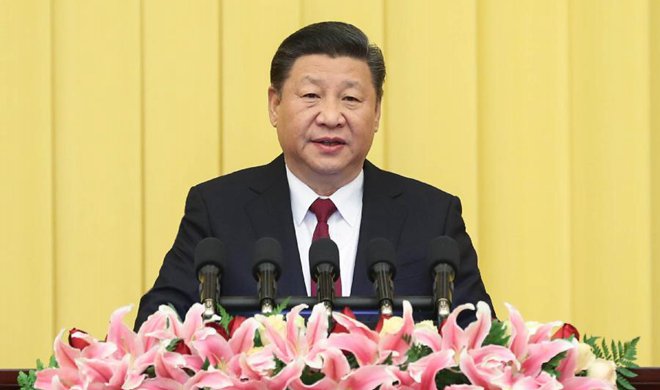by Guo Ying, Li Mengxin
BEIJING, Dec. 29 (Xinhua) -- China has improved waste management and recycling systems to tackle environmental issues caused by a build-up of garbage.
MANDATORY GARBAGE SORTING
In March, China issued a plan requiring 46 cities to carry out mandatory garbage sorting by the end of 2020. Under the plan, all public institutions and companies are required to separate hazardous waste, kitchen waste and recyclable materials.
By the end of November, 12 cities had adopted laws and regulations on garbage sorting, while 24 had introduced work programs related to the issue, according to Wang Menghui, Minister of Housing and Urban-Rural Development.
Beijing's Tongzhou District has implemented mandatory garbage sorting in public institutions and more than 2,500 restaurants. The restaurants are supposed to separate kitchen waste into a bin. Then the sanitation company will transfer the food scraps via specially designed kitchen waste trucks.
"A napkin, a chopstick, even a toothpick cannot be mixed into the kitchen waste," a restaurant employee said. "If the recyclers find other garbage included, we may be fined or punished."
Although the mandatory sorting has mainly been adopted by public institutions, residential communities are also encouraged to follow suit. Some incentives have been used to drum up enthusiasm and participation by residents.
By the end of October, more than 4 million households in Shanghai had registered to get reward credits if they throw away garbage in line with recycling requirements. The credits can be used to buy daily necessities.
Taiyuan in Shanxi Province has introduced intelligent waste recycling bins. After packaging recyclable garbage such as plastic bottles and waste paperboard, residents can paste bar codes on it and throw it into the bin to earn points for corresponding items.
MAKING THE MOST OF GARBAGE
Besides garbage sorting during collection, China is also improving its garbage treatment facilities and disposal methods to achieve harm-free disposal as well as transform garbage into a resource.
During a recent study on household garbage sorting in communities and companies, Ying Yong, mayor of Shanghai, pointed out that comprehensive garbage management is a major task for cosmopolitan cities like Shanghai.
"Improving the city's ability in harm-free waste disposal and recycling is even more important than building a couple more skyscrapers," said Ying. "We should speed up the construction of terminal garbage disposal facilities."
More cities and companies are eyeing ways to make the most of garbage. Through technological innovations, they not only can dispose of garbage in a harmless way, but also use it as a resource.
In a kitchen waste disposal factory in Changsha in central China's Hunan Province, kitchen waste goes through sorting, crushing, sifting and mechanical pressing before being turned into waste oil, waste water and waste residue.
Using advanced processing methods, the waste oil can be turned into mixed industrial oil and bio-diesel. Waste water, after anaerobic fermentation, can reach the discharging standard. Sewage gas produced during the process will be used for electricity generation or distilled into natural gas. Waste residue will feed maggots, which can be used as high-protein forage. As a result, every bit of kitchen waste is innocuously disposed of and used.
At a cement kiln in Songzi in central China's Hubei province, a coordinating project for household garbage disposal has been put into operation. Household garbage will go through crushing, sifting and winnowing procedures. Eventually it will be sorted into three categories -- combustible, noncombustible and metal.
Combustible materials will become fuel replacements for cement production, while noncombustible items will be ground and dried, then made into raw material for cement production. Metal will also be recycled and used. Cement produced in the factory has been widely used for construction of highways and bridges.
CURBING "FOREIGN GARBAGE"
China has tightened control on imported solid waste, often referred to as "foreign garbage." In July, China issued a plan for banning foreign garbage. According to the plan, China will ban imports of 24 types of solid waste, including plastic waste, unsorted paper waste, crude textile waste and vanadium slag waste by the end of 2017. Importing garbage that can be replaced by domestic resources will be phased out by the end of 2019. The types and amount of garbage imports will be cut down steadily.
According to Guo Jing, chief of the International Department at China's Ministry of Environmental Protection, imported garbage played a part in making up for a domestic shortage of resources in the past, but as the economy and society have developed, the drawbacks of this practice have emerged, including environmental pollution and health threats.
"Foreign garbage has been widely denounced," said Guo.
Despite the strict control, some companies still take risks to make profits by importing foreign garbage illegally.
The General Administration of Customs, Ministry of Environmental Protection, Ministry of Public Security, and General Administration of Quality Supervision, Inspection and Quarantine, have acted together to strengthen regulation and crack down on illicit garbage imports.
From February to December, customs across China filed 298 criminal cases against garbage smuggling, investigated and verified 866,800 tons of garbage involved, and detained 421 suspects.
Huang Songping, spokesman of the General Administration of Customs, said Chinese Customs will continue to curb the smuggling of foreign garbage and resolutely shut out all kinds of illegal foreign garbage from China.

















